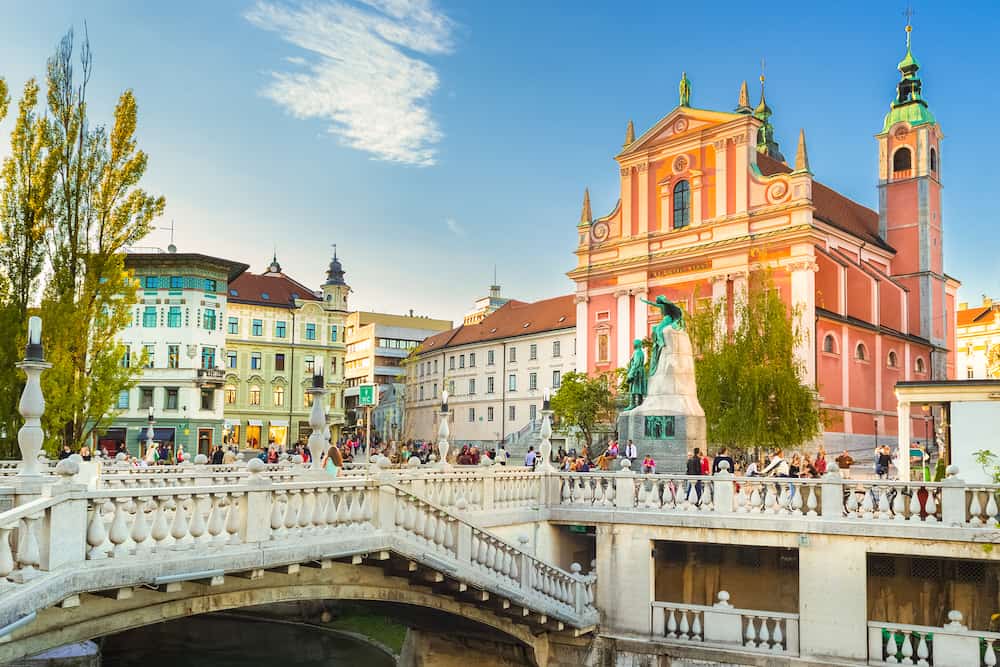20 Things to do in Ljubljana – That People Actually Do!
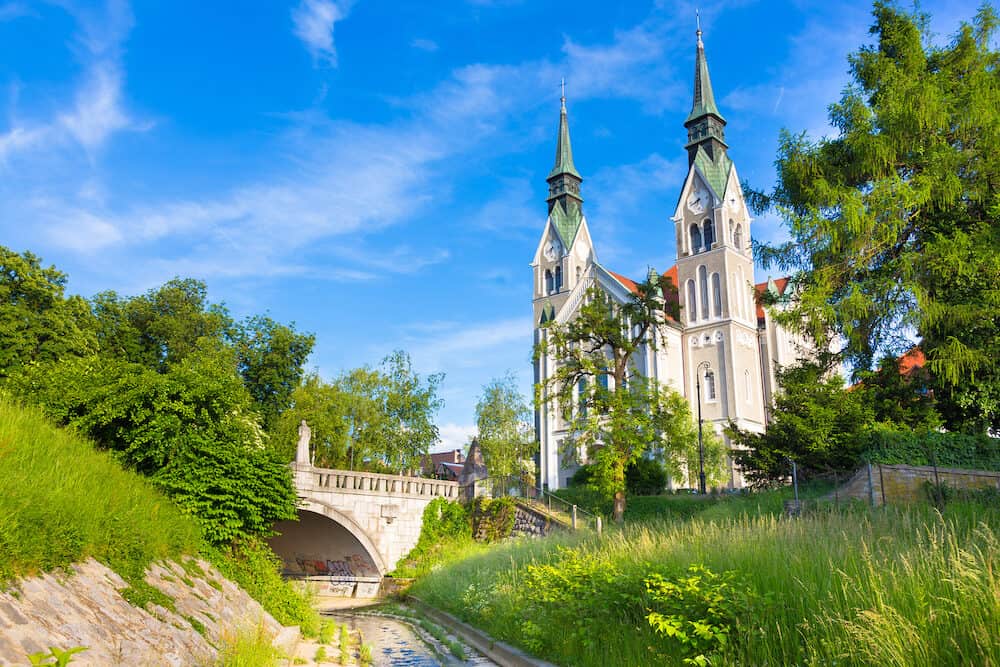
Ljubljana, Slovenia is a picture-perfect gem in Central Europe. Surrounded by snow-capped mountains and pristine lakes, Ljubljana is best-known for its breathtaking landscape.
As the capital of Slovenia, the quaint city contains the country’s main university, an abundance of art galleries, and mesmerizing architecture everywhere you look.
Combined with the gorgeous natural scenery, this youthful and creative atmosphere makes Ljubljana one of the most chilled-out cities to visit in Europe.
If you haven’t heard much about Slovenia before, you may be curious about where to go and what to do in Ljubljana. Read on to learn about 20 of the most interesting Ljubljana attractions and start planning your relaxing cultural adventure today!
Plan your trip?
Avoid hidden fees in the exchange rate while withdrawing from millions of ATMs abroad, paying in restaurants and shops, and buying your accommodation and flights using the Wise Card. You can hold up to 40+ currencies at once to spend in in over 150 countries, and convert them in real time with the free Wise app.
Need help planning your trip from start to finish? Check out these helpful links:
- Cheap flights
- Savings on accommodation from hostels to luxury hotels
- Affordable car rental options
- Affordable sightseeing tours and day trips
- Travel Adapter – All in one so you don’t have to carry a bunch around
- Don’t be silly and forget Travel Insurance! Get hurt and you’ll regret it…
This post contains some affiliate links for your convenience. Click here to read my full disclosure policy. You can also read our content/editorial policy here.
Ljubljana Castle
The first attraction you’ll want to explore in this wonderful city is Ljubljana Castle. Sitting atop Castle Hill, the former medieval fortress has looked over the city since the early 12th century.
The watchtower provides a stunning view across the city, while the castle’s museum covers centuries of Slovenia’s history. There’s a restaurant in the courtyard if you get hungry, and the Puppet Museum here will teach you about the traditional Slovene pastime of puppeteering.
Although it’s possible to reach the castle on foot, the funicular is a far more popular option. The funicular departs every 10 minutes for most of the day, taking only a minute between the two stations.
Exact operating hours for both the castle and the funicular depend on the time of year, so check in advance if you’re headed there later at night.
There are various tickets you can purchase that include entry to the castle, a return journey on the funicular, and various activities like an escape room game and a guided tour.
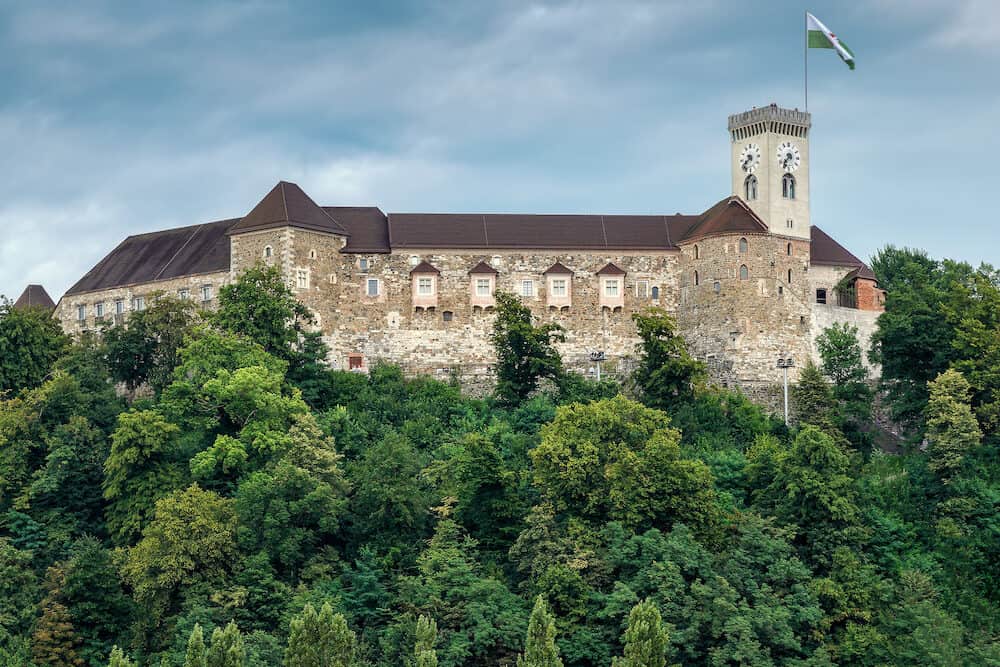
A Kavalir Ride
A superb way to start exploring the city is to hop aboard a Kavalir. These small green carts operate between 8 a.m. and 8 p.m. daily, transporting tourists as well as the local elderly residents around Ljubljana. If you spot one while out and about, simply wave your hand to alert the driver. Best of all, the rides are completely free.
Maybe you want to head straight to a specific attraction or sit back and ride around for a little while. It’s completely up to you!
Ljubljana was named the European Green Capital in 2016, and these eco-friendly vehicles are yet another fantastic step towards Ljubljana growing into a green city.
Tivoli City Park
The largest public park in Ljubljana is Tivoli City Park. The elegantly landscaped gardens were first created in the 1800s surrounding Tivoli Pond, a longtime emblem of the city.
The pond is a popular spot to relax or fish, with an open-air library on the lawn nearby. To the northwest of the pond are a beautiful rose garden and a greenhouse full of tropical plants, managed by the University of Ljubljana Botanical Gardens.
Throughout the park’s five square kilometres are stunning properties like Tivoli Castle, a charming mansion built in the 17th century.
In front of this castle are four cast-iron dogs, which have become famous for not having tongues. The Jakopič Promenade, designed by Jože Plečnik, runs throughout the park and is an excellent walking trail.
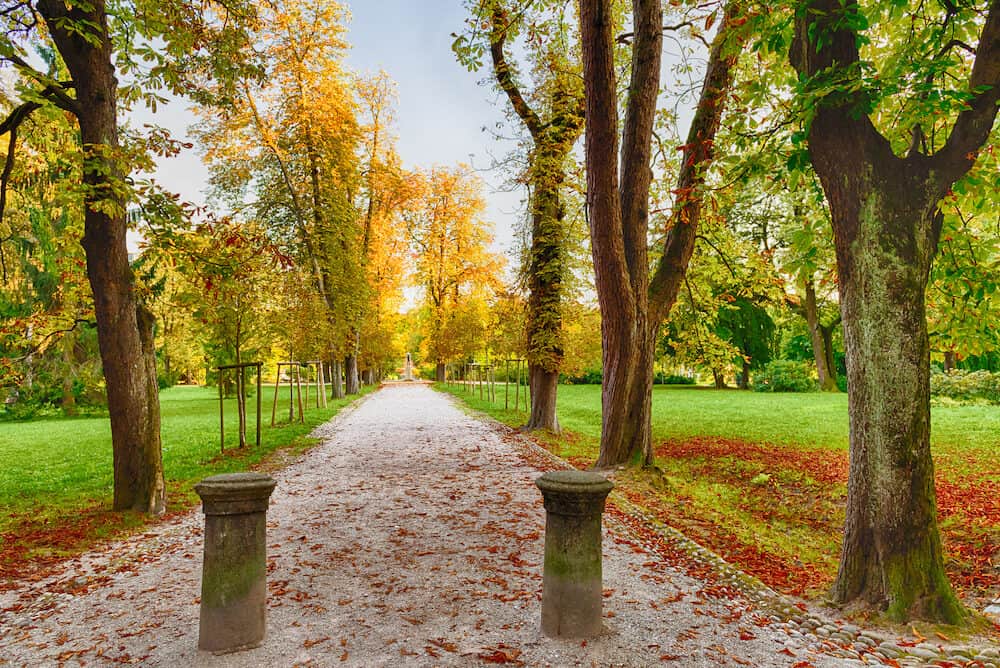
National Museum of Contemporary History
Since 1952, the Cekin Mansion in Tivoli City Park has housed Slovenia’s National Museum of Contemporary History.
The pale-pink mansion was built in the 1700s based on Viennese Baroque designs. Inside are exhibitions on the country’s involvement in World Wars I and II, life under socialism, and the country’s independence from Yugoslavia.
It is fascinating to learn what Ljubljana has been through in the past century through the various artifacts and modern, interactive displays. In addition to the permanent exhibition on life during the 20th century, temporary retrospectives and special events are also held here.
Stop by between 10 a.m. and 6 p.m. on any day except Monday. The regular admission price per adult is €5, and visits are free on the first Sunday of every month.
Robba Fountain
In front of the Ljubljana Town Hall in Town Square is a replica of Robba Fountain. The majestic fountain was built and unveiled in the mid-1700s.
The three male figures carrying jugs at the bottom represent the three main rivers of Carniola (present-day Slovenia).
Although the original structure is now located in the National Gallery, it’s still cool to see this replica in its initial location.
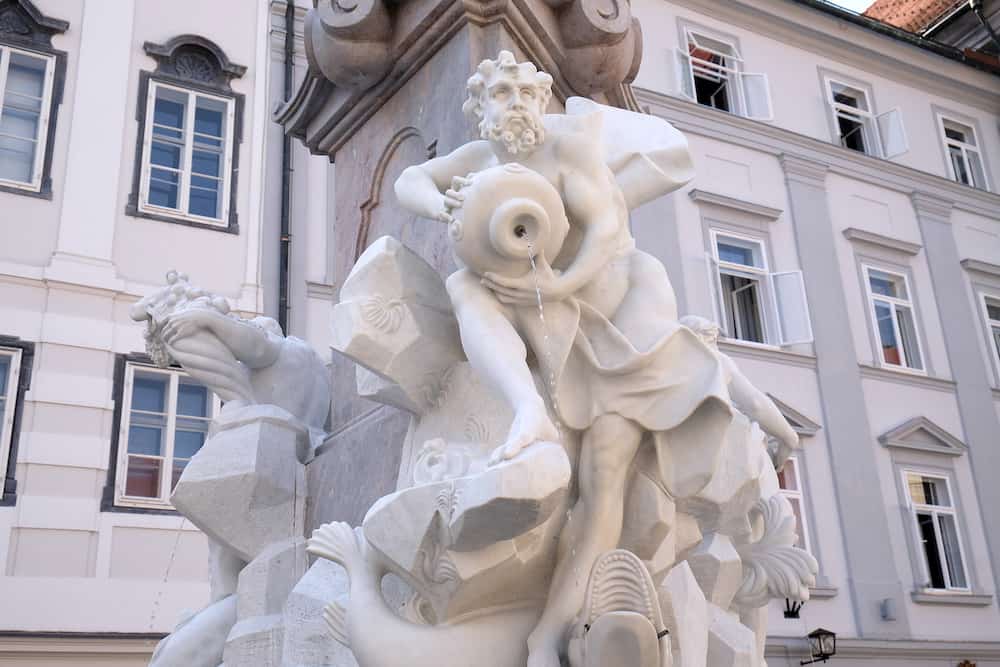
Metelkova
Easily the most unique and fascinating attraction in Ljubljana is Metelkova Mesto. An abandoned barracks in the city’s northeast began its transformation into an artistic hub after squatters began to illegally occupy the area following the collapse of Yugoslavia.
Metelkova is now an “autonomous social and cultural centre”, and one of the biggest urban squats in the world.
Every wall is vibrantly covered with colourful graffiti, and you’re greeted at every turn by an unusual art installation. On the surface, Metelkova is simply an eclectic tourist attraction.
For residents, it’s a haven for the alternative crowd, promoting acceptance and community, political activism, and underground music. Come during the day for some incredible photo opportunities, then return in the evenings to check out the lively bars and clubs.
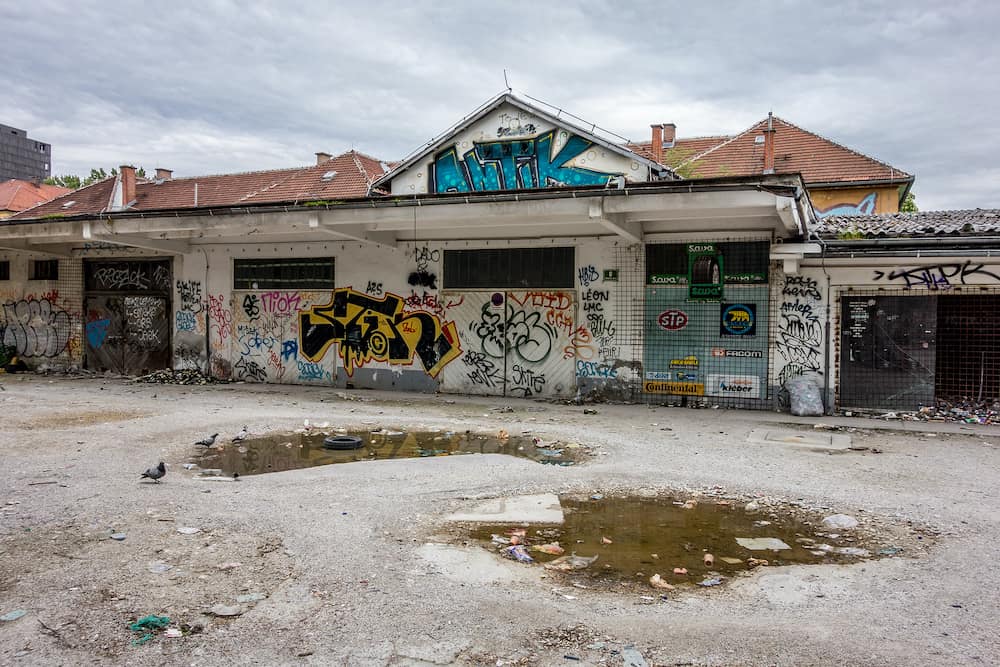
Dragon Bridge
An iconic site in Ljubljana is the Dragon Bridge. Crossing the Ljubljanica River, the 33-metre-long arch bridge is known for its copper dragon statues on both sides.
Designed in a Viennese Secessionist style, it opened in 1901 and is considered today as a protected monument.
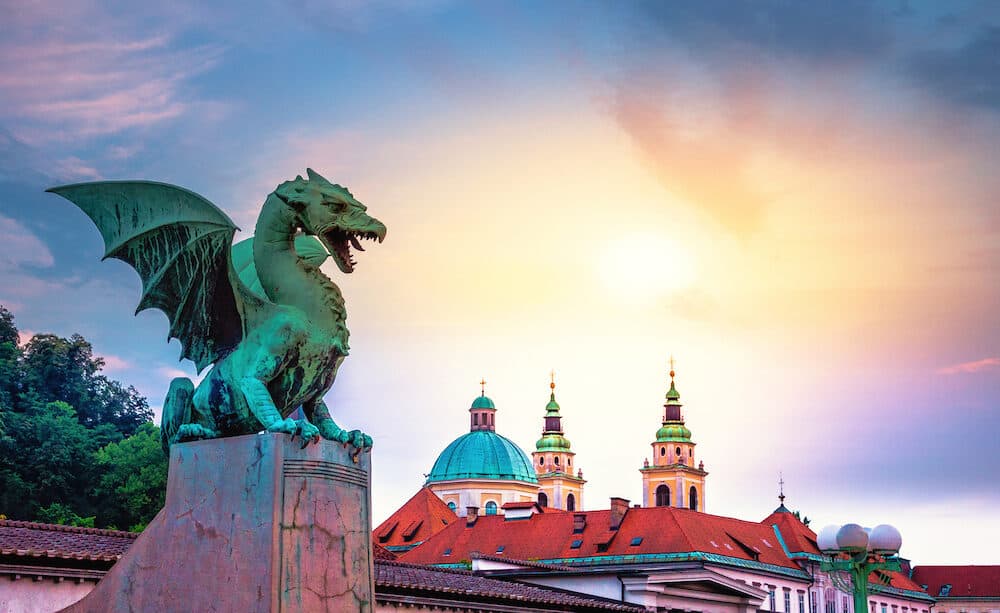
Žale Central Cemetery
One of the more unusual attractions to check out in Ljubljana is Žale, the city’s central cemetery. Considered the Père Lachaise of Slovenia, more than 2,000 prominent Slovene writers, painters, composers, leaders and other figures are buried here. It is also the resting place of Jože Plečnik, the architect who designed the cemetery.
The incredible two-storey arched entrance symbolizes the division between the worlds of the living and the deceased.
Beyond the entrance are chapels and headstones in various architectural styles, from Byzantine to Greek and even a combination of multiple styles. It’s worth a visit to take a few quiet moments of reflection and appreciate the beauty surrounding you.
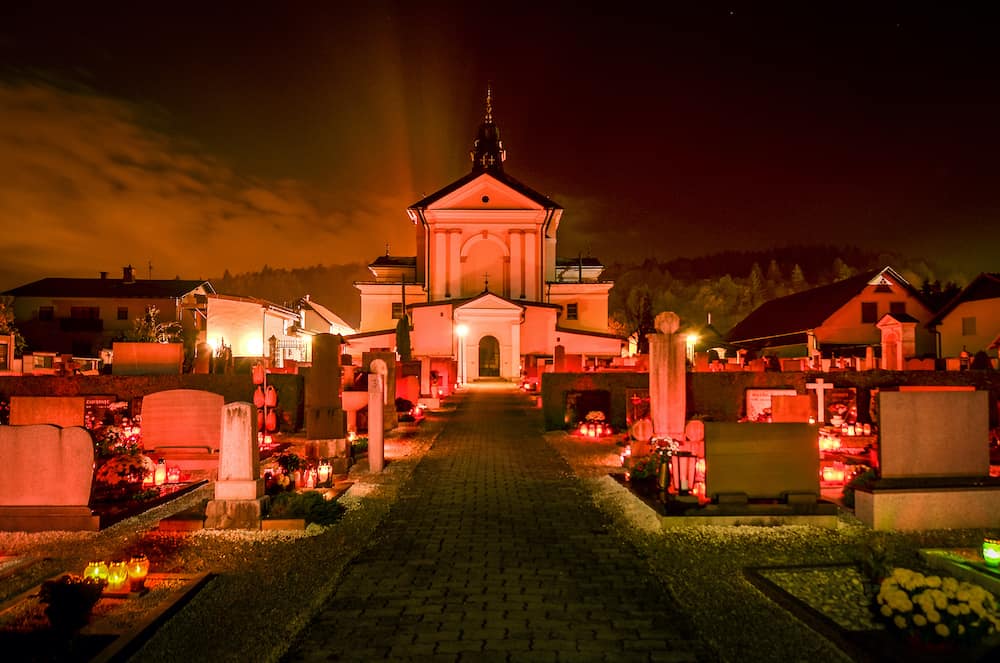
Triple Bridge
Crossing the Ljubljanica River by Prešeren Square is a unique trio of bridges called Tromostovje, aka Triple Bridge.
The central bridge is the oldest and made from limestone, now connecting the historic Old Town with the more modern side of Ljubljana. The other two concrete bridges were added almost 90 years later in the 1930s.
Each pedestrian-only bridge is embellished with elegant lanterns and balustrade panels. Be sure to come by in the evening when the entire area is magically illuminated.
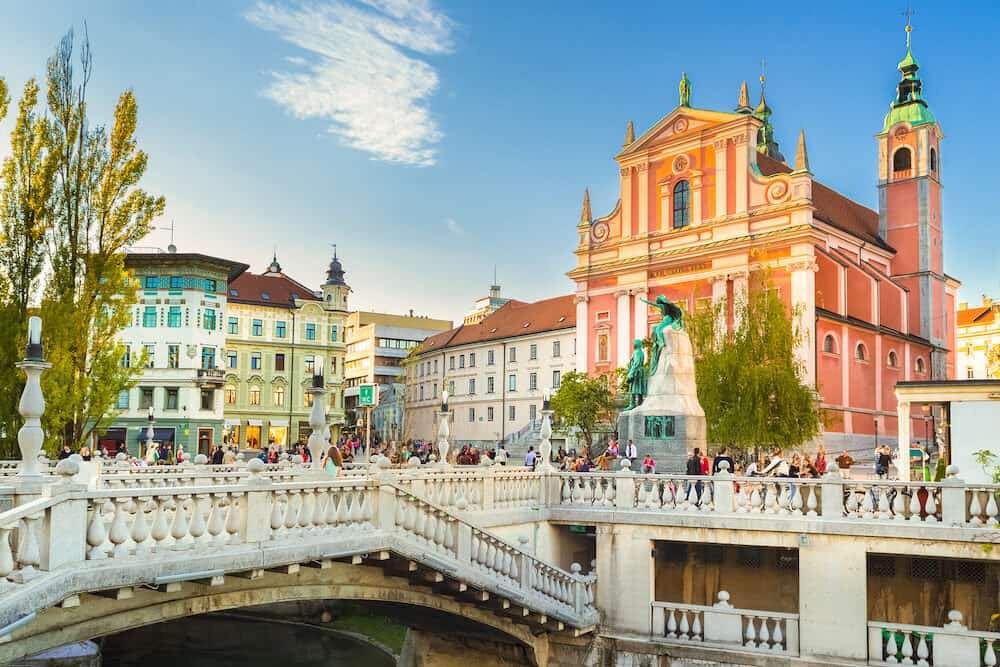
The Franciscan Church of the Annunciation
Ljubljana’s Franciscan Church of the Annunciation is a gorgeous faded-red church built in the mid-1600s. Overlooking the Ljubljanica River opposite the Triple Bridge, this early-Baroque building adds some extra colour to Prešeren Square.
Inside the church are some stunning Baroque paintings, including an 18th-century altarpiece by the renowned Baroque sculptor Francesco Robba.
Although the Ljubljana earthquake in 1895 caused significant damage to the ceiling, the newer frescoes by impressionist painter Matej Sternen are just as impressive as the originals.
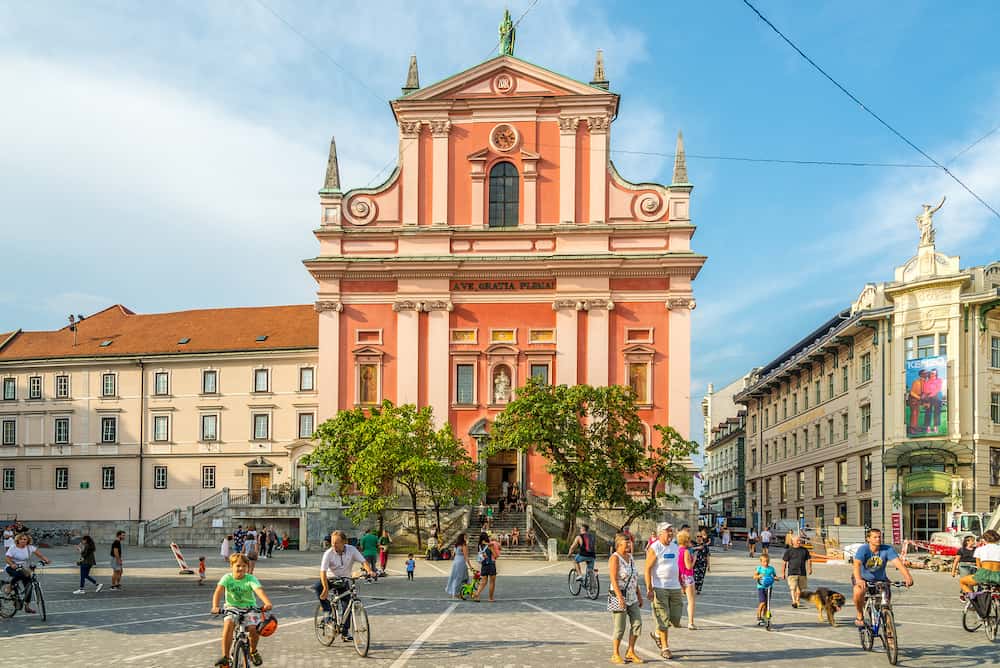
National Gallery of Slovenia
There are plenty of ways to keep warm during the colder months while still exploring the city. One of the top things to do in Ljubljana in winter is to spend a few hours at the National Gallery of Slovenia.
Founded in 1918, the museum has been at its current location since 1925. The enormously opulent building holds an extensive collection of fine art from the 13th century onwards.
Learn about each distinctive art period, from the High Middle Ages to the Renaissance era, Mannerism to High Baroque, and all the way up to Expressionism in the early 1900s. The original Robba Fountain was moved here in 2008 for preservation and can be viewed in the entrance hall.
The gallery is open between 10 a.m. and 6 p.m. from Tuesday to Sunday or until 8 p.m. each Thursday.
Regular admission to the permanent collection costs €7 while any temporary exhibitions cost €5. You can also purchase a combined ticket for €10, or stop by on the first Sunday of each month when admission is free for everyone.
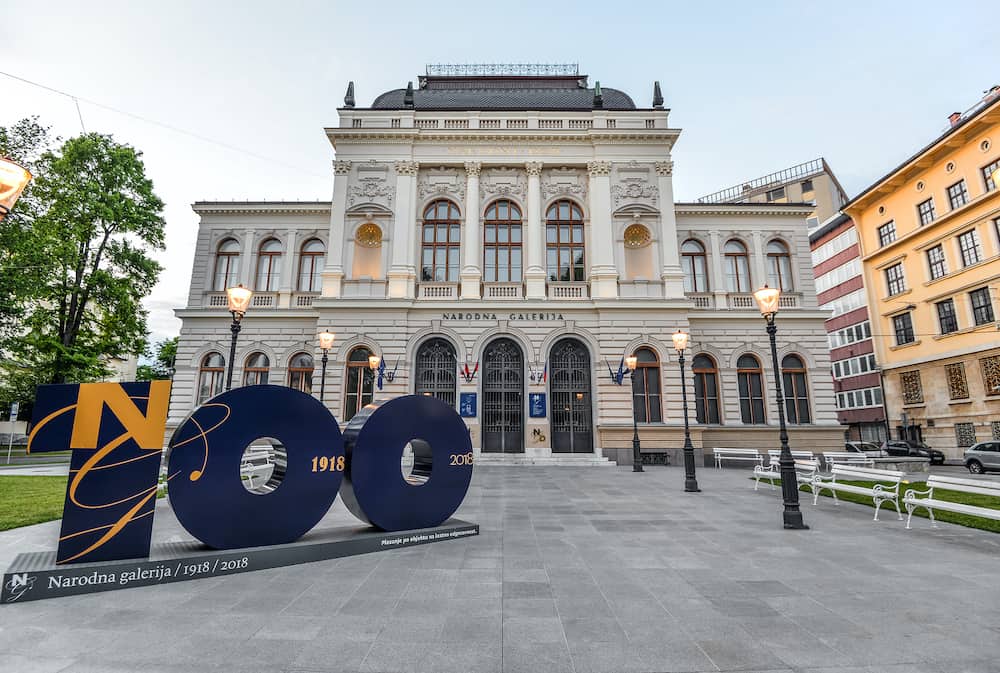
Central Market
Between the Triple Bridge and the Dragon Bridge along the bank of the Ljubljanica River, you’ll uncover the Ljubljana Central Market.
Beyond a place to shop for fresh produce, the market is a lively meeting place for the city’s residents. After almost a decade of planning, the hall was built in the early 1940s following the designs by Jože Plečnik.
The two-storey Renaissance structure has circular windows overlooking the water with even more open-air stalls outside.
The market is open every day except Sunday from 7 a.m. until mid-afternoon. Stop by to peruse the stalls selling fresh flowers, dried fruit, baked goods and more.
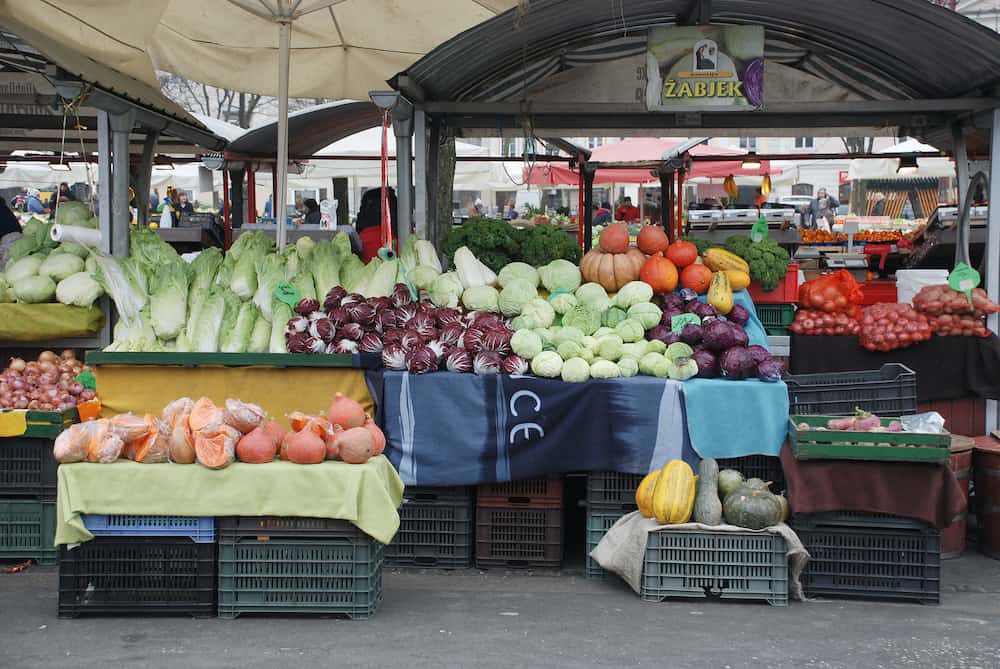
Plečnik House
As you may have already picked up on, Jože Plečnik was a prominent Slovene architect responsible for designing many of Ljubljana’s most significant structures. At Plečnik House, you can learn about his life and discover more of his memorable work.
View sketches, models and photographs by Plečnik and take a look around his former workshop. The main house was lived in by Plečnik himself and has been kept as it looked during the last decades of his life.
Take a look around the charming property and garden any time between 10 a.m. and 6 p.m. from Tuesday to Sunday. Regular admission costs €6, and free guided tours run every hour.
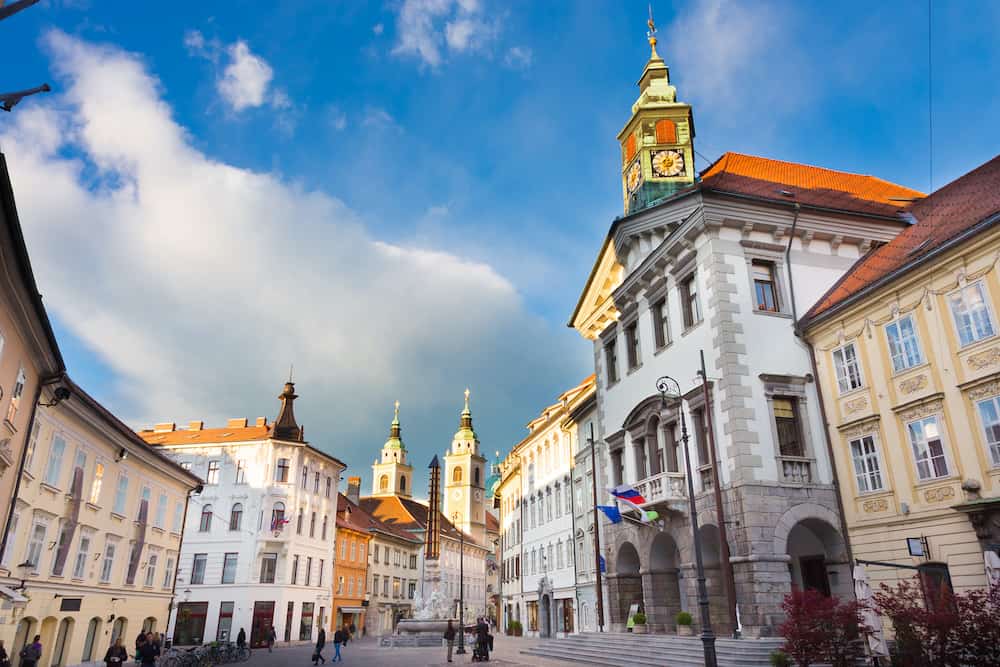
Slovene Ethnographic Museum
For a captivating exploration of cultural identity, visit the Slovene Ethnographic Museum. This museum aims to draw a link between the past and the present, whether it be our natural environment and modern civilisation or Western societies and traditional cultures.
Each exhibition will leave you with something to reflect on, from your place in the world to our various attitudes and spiritual beliefs. To balance things out, there’s even a permanent exhibit and workshop on gingerbread making.
As with most attractions in Ljubljana, the Ethnographic Museum is open between 10 a.m. and 6 p.m. from Tuesday to Sunday, with free admission on the first Sunday of the month. On every other day, the standard entrance price per adult is €6.
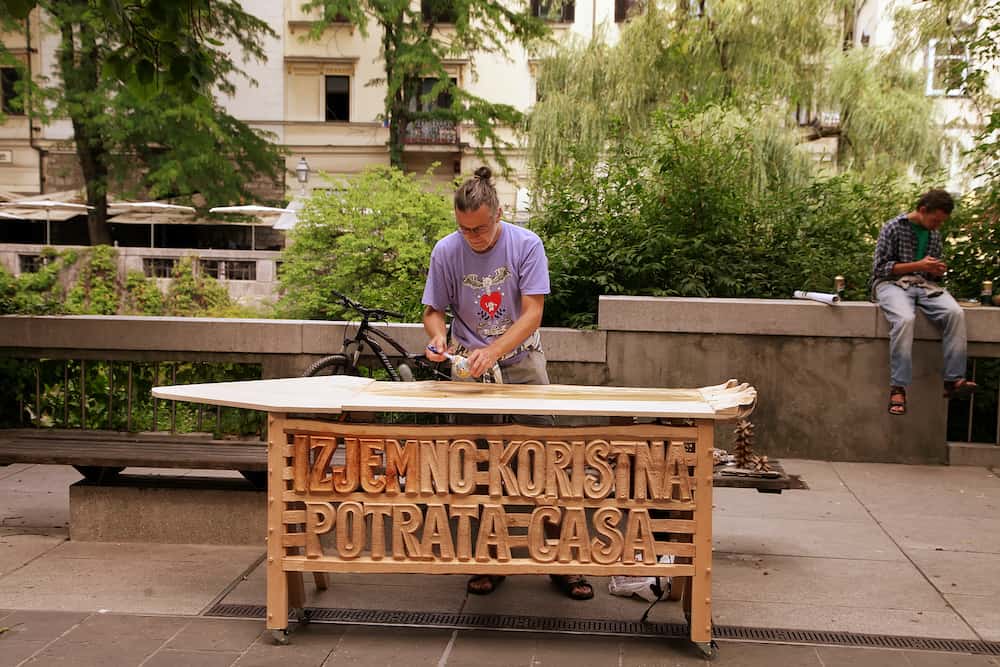
Art Nouveau Walking Tour
Gain a greater appreciation for the city’s Art Nouveau architecture on a two-hour guided tour around the city.
Many eye-catching Viennese Secession buildings began to take over Ljubljana around the turn of the 20th century, from the unusual Hauptmann House in Prešeren Square to the eclectic Vurnik House along Miklošičeva Street.
A tour will not only ensure you see the most impressive buildings in the city, but it will also provide you with some in-depth insights into one of the most popular trends in art and architecture.
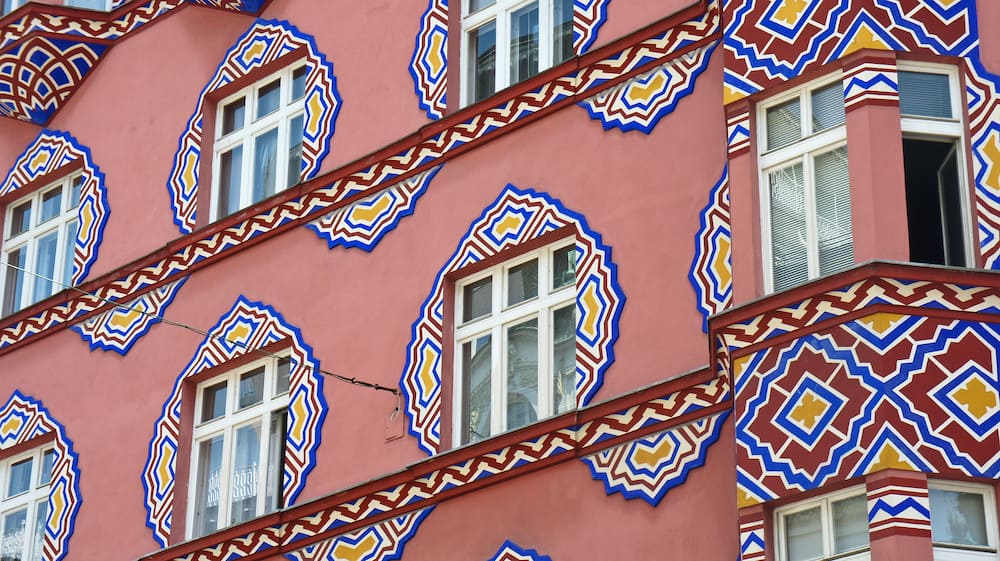
Lake Bled
A day trip you simply can’t pass up while in Ljubljana is a visit to Lake Bled. Depart from the city on a full or half-day tour out to this incredible turquoise beauty located in the Julian Alps. Your private driver will know the top places to go for the most beautiful views of the lake, so you can sit back and enjoy the picturesque surroundings.
On the north shore atop a rocky hill sits the medieval Bled Castle, mysteriously looming over the lake. Dating back to as early as 1011, the Romanesque and Renaissance-style treasure is assumed to be the oldest remaining castle in Slovenia.
Entrance to the castle and its small museum usually costs €11 per adult, so check in advance if this is included in your tour. In the middle of the lake, you will also spot a tiny island, home to a few charming and historic churches and houses.
Some tours also combine Lake Bled with a trip to the tranquil Lake Bohinj, less than 30 kilometres west. If you’re here during the summer, this lake is a refreshing spot for swimming and cooling down.
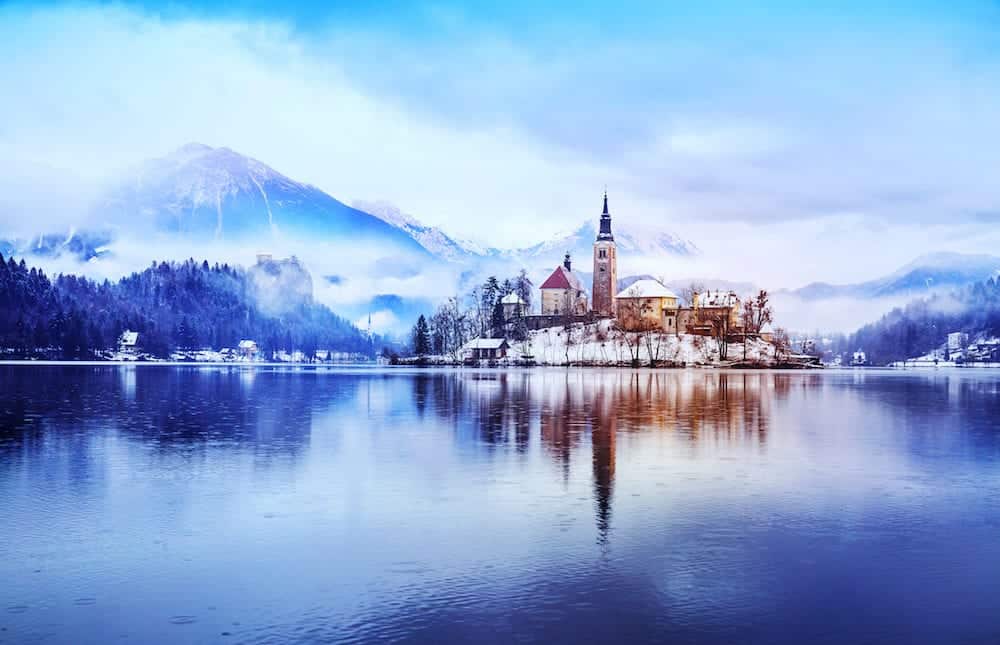
Food and Wine Tour
Discover how the locals dine with the Ljubljana Food and Wine Walking tour. Across two hours, you’ll taste nine different Slovene specialities, as well as some locally-produced wine.
You’ll also discover the different types of restaurants in the city and their roles in Slovene culture, including a traditional tavern called a gostilna.
Take this tour during your first or second day in the city so that you can head back to any restaurants or re-order any of the dishes you enjoyed. Afterwards, you’ll be an expert at ordering Slovene cuisine!
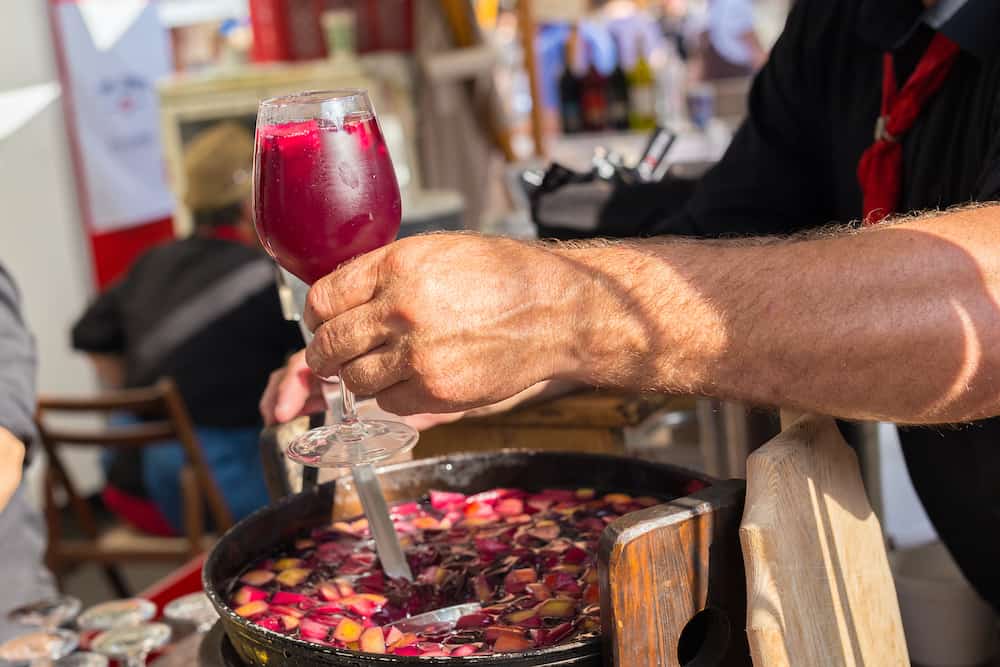
Ljubljana Cathedral
The extraordinary Ljubljana Cathedral was built in the early 18th century to replace an earlier Gothic church. This Baroque beauty is easily identified by its green octagonal dome and twin towers.
The frescoes adorning the cathedral’s high ceilings and arches are absolutely breathtaking, as are the gold leaf embellishments and the extravagant pipe organ.
Also known as the Church of St Nicholas, this is one cathedral you absolutely must see inside. It’s closed between noon and 3 p.m. so be sure to head there in the morning or early in the evening.
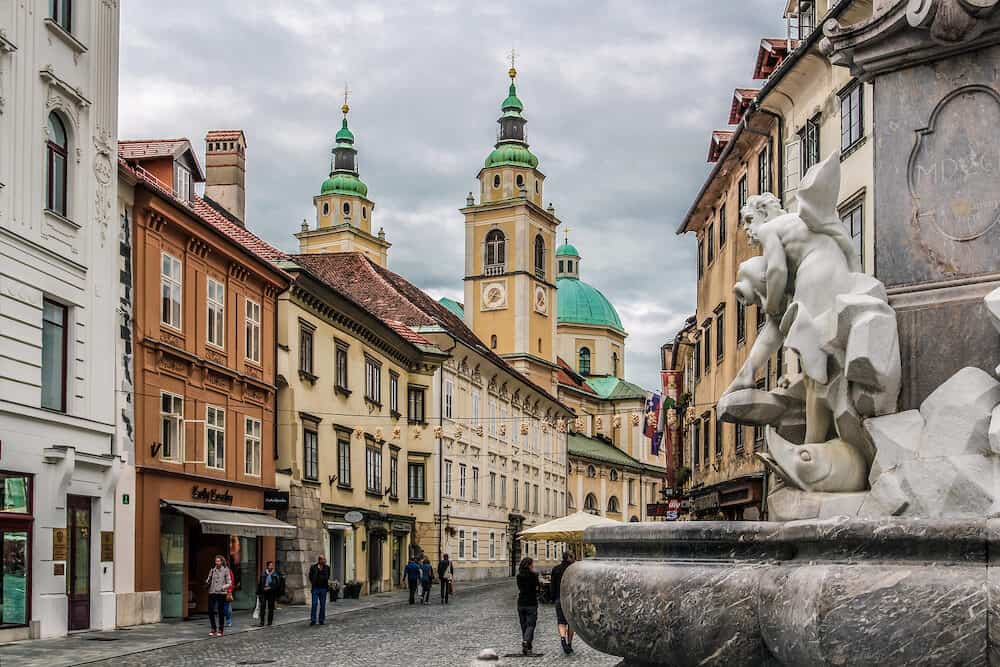
Museum of Modern Art
For the very best contemporary Slovene artwork, you’ll want to add the Museum of Modern Art to your list. You’ll certainly see some eclectic and one-of-a-kind pieces here.
Appreciate the expressionist and surrealist paintings by France Mihelič and Stane Kregar, then admire the abstract sculptures by Jakob Savinšek. Many of the temporary exhibitions delve into social issues such as freedom of expression in Europe.
Visit between 10 a.m. and 6 p.m. on any day except Monday, and stop by the Moderna Coffee Shop while you’re there. Entrance costs €5 per adult.
Postojna Caves and Predjama Castle
If you’re wondering about other memorable day trips from Ljubljana, a journey to Postojna Caves and Predjama Castle is a once-in-a-lifetime experience.
Once you reach Postojna, about 50 kilometres southwest of Ljubljana, you’ll board a mini train and make your way into the 24-kilometre-long karst cave system.
Created by the Pivka River, these caves have been around for millions of years. Your guide will show you around and point out the eerie stalactites and stalagmites, as well as the other bizarre rock formations.
Afterwards, you’ll get a chance to visit the mysterious 16th-century Predjama Castle. Emerging from the mouth of a limestone cave, this Renaissance castle is the third to exist here after the previous two were destroyed. This castle is truly special and has a fascinating history you will enjoy learning about.
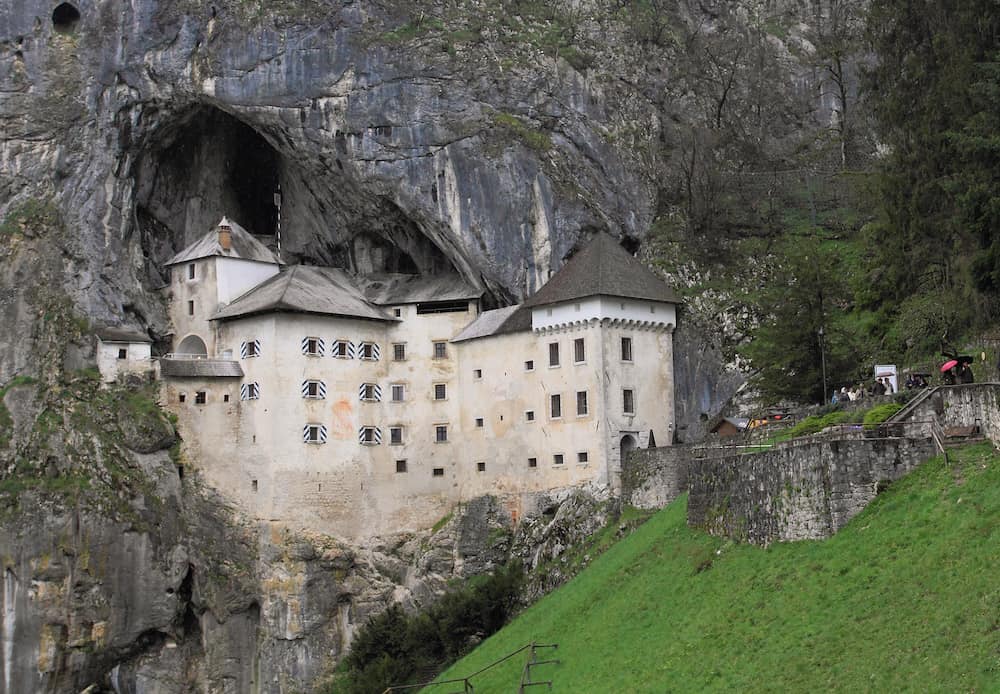
Recommended tours in Ljubljana
- Bled Lake with Postojna Cave & Castle – small group – day tour from Ljubljana
- Lakes Bled & Bohinj and Vintgar Gorge Small-Group Day Trip from Ljubljana
- Skocjan Caves, Lipica & Piran: Karst & Coast Small-Group Day Trip from Ljubljana
- Chocolate and premium wines of Slovenia – from Ljubljana
- Rafting and zipline in Bled Slovenia
- Full-Day Triglav National Park Tour from Ljubljana
- Wine Tour East Slovenia
- Velika Planina Mountain Plateau, Škofja Loka and Kamnik Tour from Ljubljana
If you’d like to save it for later, please save it to Pinterest.
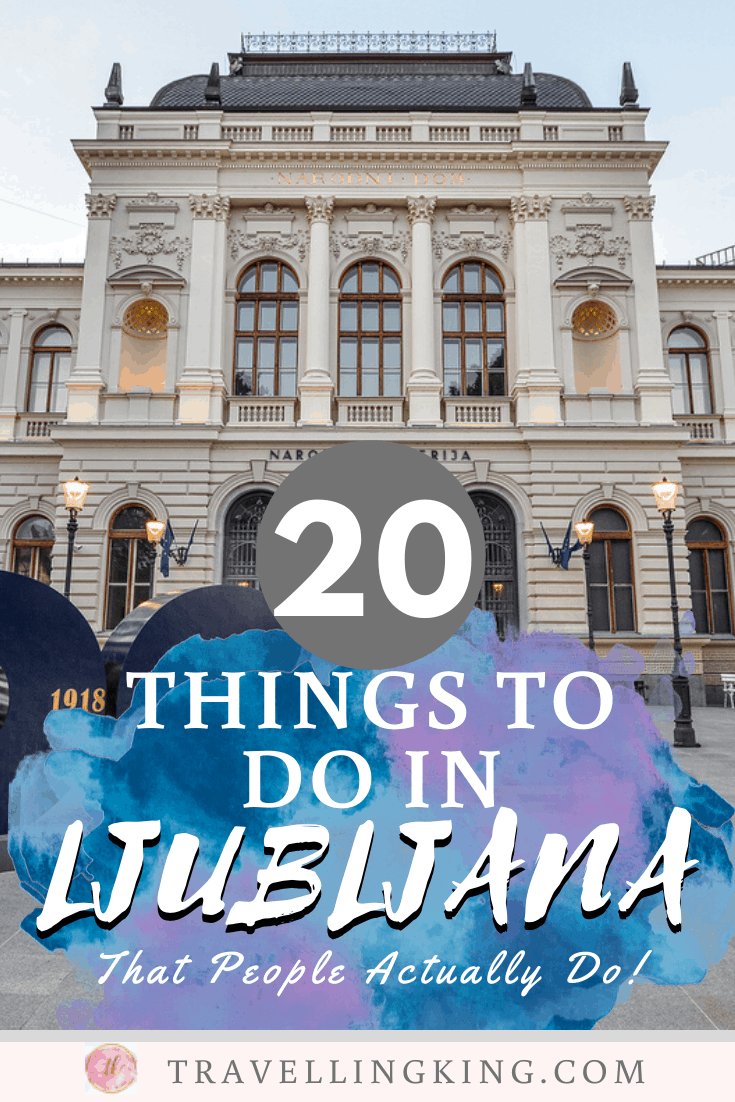
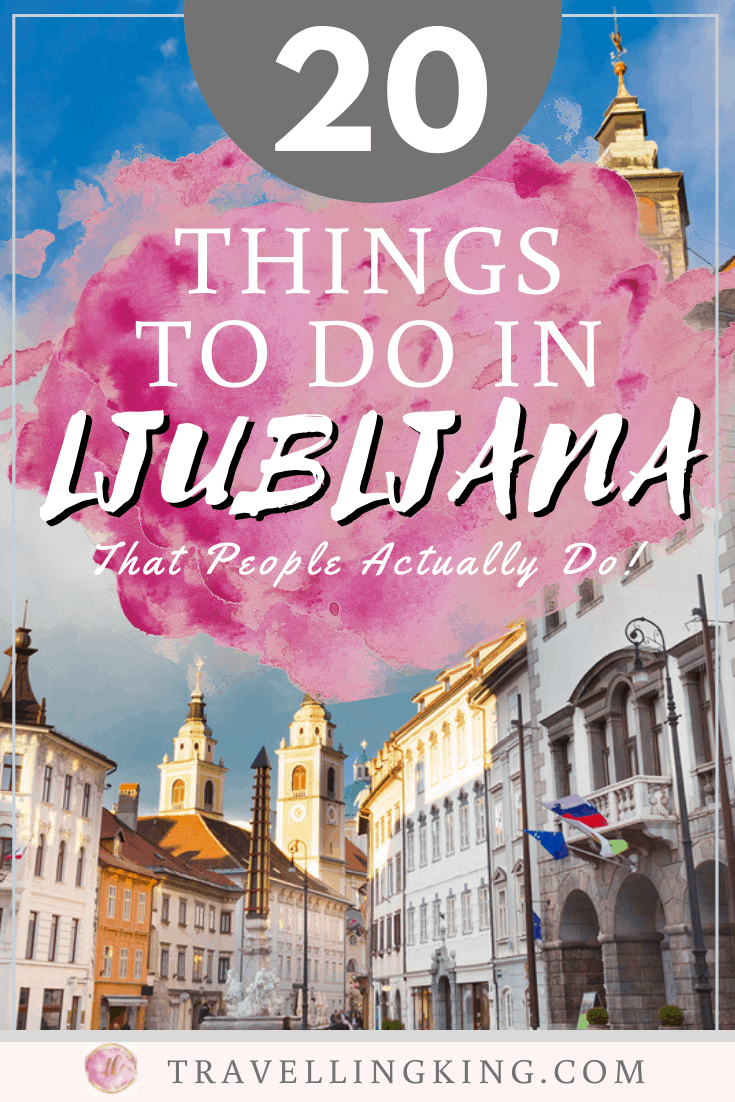
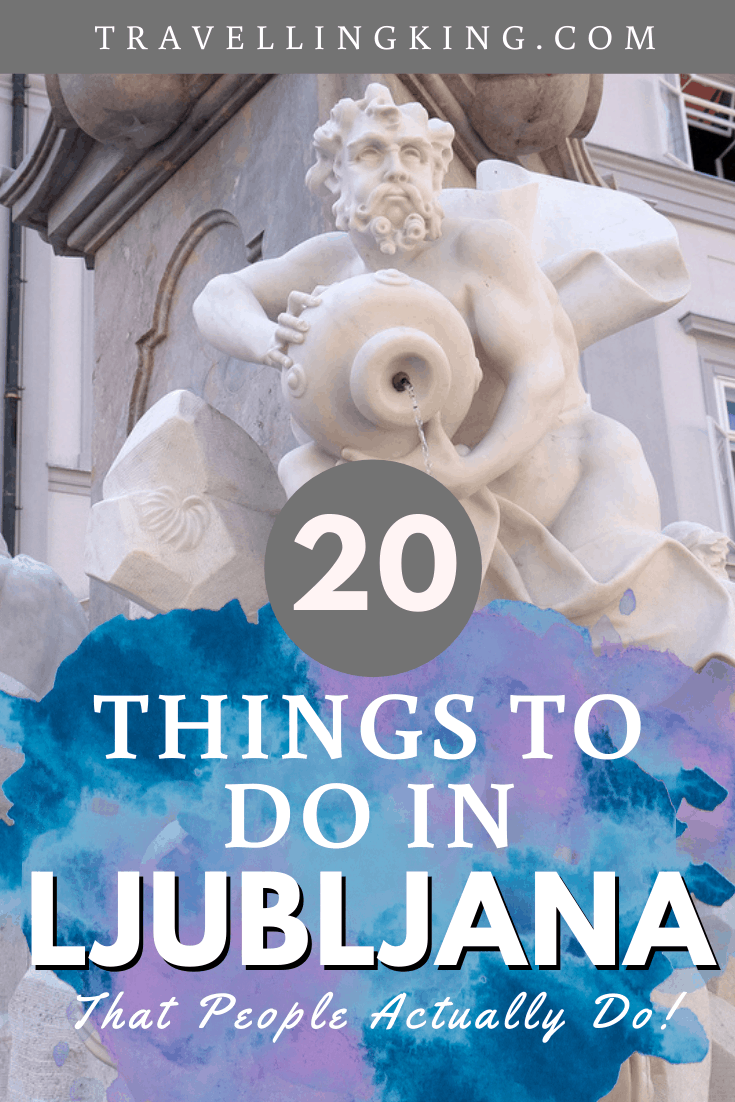

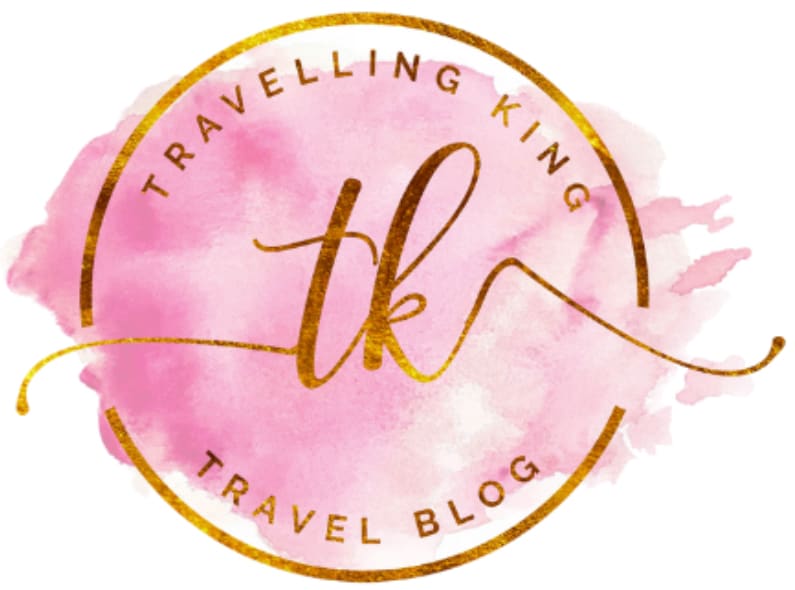
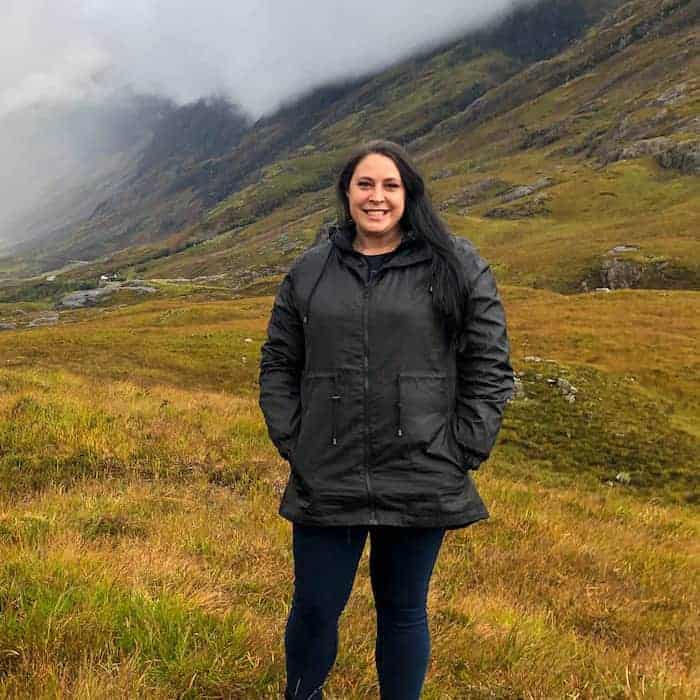
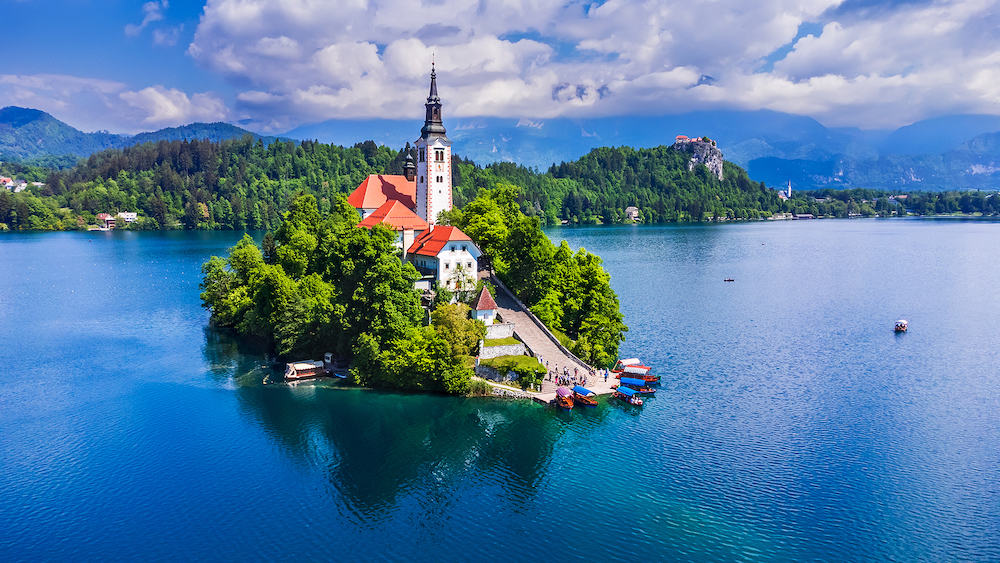
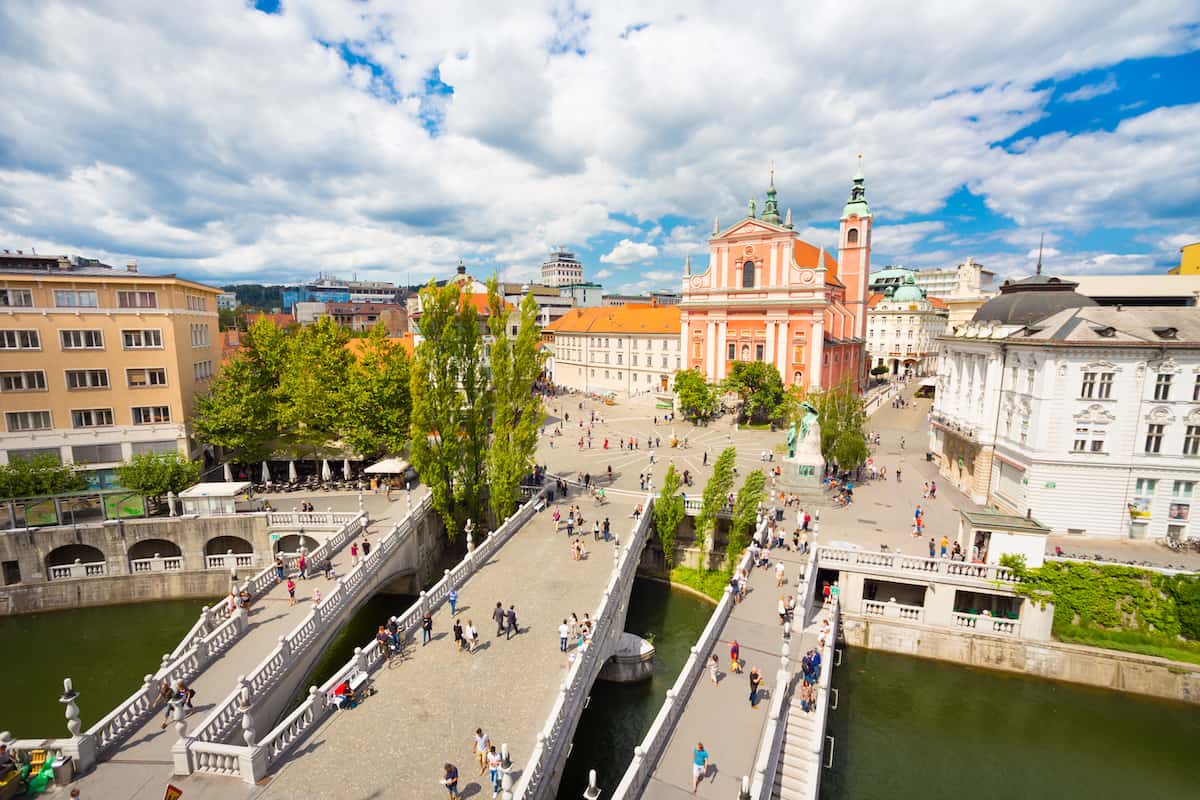
![Where to stay in Ljubljana [Best Places to Stay for 2024]](https://www.travellingking.com/wp-content/uploads/2023/02/Ljubljana-Cityscape-of-Ljubljana-capital-of-Slovenia.jpg)
